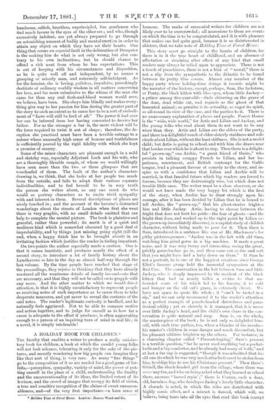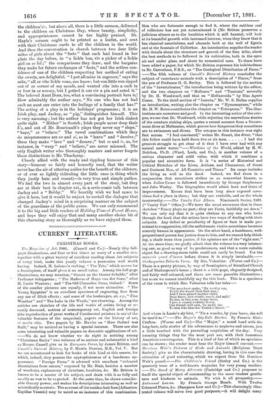A HOLIDAY BOOK FOR CHILDREN.*
Tar: faculty that enables a writer to produce a really satisfac- tory book for children, a book at which the candid young folks will not look askance, tolerating it only for the sake of the pic- tures, and secretly wondering how big people can imagine they like that sort of thing, is very rare. As many "fine things" go to the composition of it as are needed for a good game of for- feits,—perception, sympathy, variety of mind, the power of put- ting oneself in the place of a child, understanding the finality and the unconventionality of its ideas, the limited extent of its horizon, and the crowd of images that occupy its field of vision, a true and sensitive recognition of the claims of sweet unreason- ableness, and—of the very first importance—a keen sense of
• Holiday Time a Forest iLottoe. Loudon; Marcus Ward and Co.
humour. The ranks of successful writers for children are not likely ever to be overcrowded ; all accessions to them are events on which the time is to be congratulated, and it is with pleasure that makes one feel quite good, because it is so disinterested in oldsters, that we take note of Holiday Time at Forest House.
This story must go straight to the hearts of children, for there is in it the true heart of childhood, and an absence of affectation or straining after effect of any kind that small readers may always be relied upon to appreciate. There is not a touch of preachiness, there is not a hint of " moral," there is not a slip from the sympathetic to the didactic to be found between its pretty blue covers. Almost any member of the happy party whose holiday-time doings it records might be the narrator of the history, except, perhaps, Sam, the factotum, or Ponty, the black kitten with blue eyes, whom little Jackey- a prince among five-year-olds—finds shivering on the grave of the dear, dead white cat, and regards as the ghost of that lamented animal ; so genuine is its actuality, so eager its spirit, so all-round its view of the case, and the parties to it. There is no unnecessary explanation of places and people. Forest House is the " wide, wide world," for Artie and Lilian and Jackey, and the young folks who read about them do not want to be any wiser than they. Artie and Lilian are the elders of the party, and there is a delightful touch of elder-sisterly staidness and soli- citude about Lilian, without the least stiffness. She is not a model child; but Artie is going to school, and with him she draws near that border over which he is about to step. Then there is a delight- ful " grown-up," one Archie, " a great friend of theirs," who persists in talking scrappy French to Lilian, and her im- patience, resentment, and British contempt for the Gallic tongue, lend a pleasant flavour of comedy to the story, and in- spire us with a confidence that Lilian and Archie will be married, in that fanciful future which big readers are forced to foresee, because they are distressingly wise, but which does not trouble little ones. The writer must be a close observer, or she would not have made the very happy hit which is the first of the story, when Archie has to draw strongly upon his courage, after it has been decided by Lilian that he is bound to tell Archie, the " grown-up," that his ghost-stories frighten him and little Jackey. Artie, having to choose between the fright that does not hurt his pride—the fear of ghosts—and the fright that does, and worked up to the right point by Lilian (as the grown-up immediately discerns), is a capital study of childish character, without being made to pose for it. Then there is Sam, introduced in a sentence like one of Mr. Blackmore's for pithy picturesqueness : "Jackey was in the loft with old Sam, watching him grind gorse in a big machine. It made a great noise, and it was very funny and interesting seeing the great, prickly gorse-bushes go in, and then come out so tine and soft that you might have laid a baby down on them." If Sane be not a portrait, he is one of the happiest creations since George Eliot's famous group held the immortal symposium at the Red Cow. The conversation iu the loft between Sam and little Jackey, who is deeply impressed by the incident of the black kitten that had so nearly fallen a victim to that un- founded scare of his which led to his leaving it to cold and hunger on the old cat's grave, is extremely clever. WI; have not space to quote the whole ; it " can't be tasted iu a sip," and we can only recommend it to the reader's attention as a perfect example of puzzle-headed shrewdness and para- doxical oddity ; yet so cleverly is it managed, that it is never over little Jackey's head, and the child's own share in the con- versation is quite natural and easy. Sam is, on the whole, the master-piece of the book ; he is not only so delightful him- self, with such true pathos, too, when a blunder of his involve.; his master's children in some danger and much discomfort, but his pleasant oddities brighten up the others. For instance, iu a charming chapter called " Present-buying," Sam's present is a terrible question," for he never used anything but a pocket- knife and a big comforter, and he already had many of both," and at last a fur cap is suggested, " though it was admitted that his old one (to which he was very much attached) must be stolen from him, to oblige him to use his Christmas present." Then there's Grizell, the shock-headed girl from the village, where there was never any fun, and who on being asked what they learned at school there, answers " lamed cryin' ;" there is Corran, such a dear, old, harmless dog, who developes Jackey's lovely little character. A charade is acted, in which the rides are distributed with highly comic effect, and a minuet is danced, which will, we believe, bring tears into all the eyes that read this book (except the children's) ; but above all, there is a little sermon, delivered to the children on Christmas Day, whose beauty, simplicity, and appropriateness cannot be too highly praised. Dr. Hayle's sermon ought to be printed as a leaflet, and sent with their Christmas cards to all the children in the world. And then the conversation in church between two dear little mites of girls about the " feets " that each had found in her plate the day before, in " a lickle box, viv a picker of a lickle girl on ze lid ;" the comparisons they draw, and the bargains they make for future exchanges of "feets," and the artless con- fidence of one of the children respecting her method of eating the sweets, are delightful. " I put all mine in zegezzer," says the mite, " all ze vite lickle vons, zoo know; but von little von sipped out of ze corner of my moufe, and wented zite into a tack in ze foor in ze nursey, but I gotted it out viv a pin and eated it." The beloved Aunt Dora, too, what a convincing portrait hers is,! How admirably the author says, " No one who has not had such an aunt can enter into the feelings of a family that has !" The acting of a play is in the holidays' programme; it is an Irish play, and Jackey, as " pig," distinguishes himself. This is very amusing ; but the author has not got her Irish dialect quite right. " Mither" is Scotch ; Irish people never drop their la's, and out of Mr. Boucicault's plays they never say " slape," " kape," or " belave." The vowel combinations which they do mispronounce are ea and el, as in "leave" and " deceive ;" these they make " lave " and " desave ;" but ee and ie, as, for instance, in " weep " and " believe," are never misused. The only English writer who thoroughly masters and never forgets these distinctions is Mr. Thackeray.
Closely allied with the ready and rippling humour of this story—humour so fairly and honestly used, that the writer never has the air of uttering asides for the benefit of the oldsters, or of ever so lightly ridiculing the little ones (a thing which they justly hate and resent)—is very true and simple pathos. We find the two in almost every part of the story, but they are at their best in chapter xvi., in a serio-comic talk between Jackey and a " Bobby." We heartily wish we had space to give it here, but it would be unjust to curtail the dialogue that changed Jackey's mind in a surprising manner on the subject of the guardians of the public peace. We can only recommend it to the big and little readers of Holiday Time at Forest House, and hope they will enjoy that and many another choice bit of this charming story as thoroughly as we have enjoyed them.











































 Previous page
Previous page